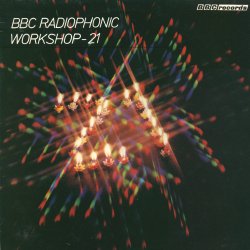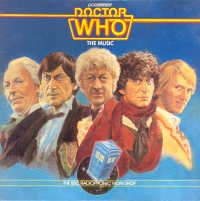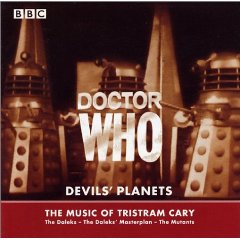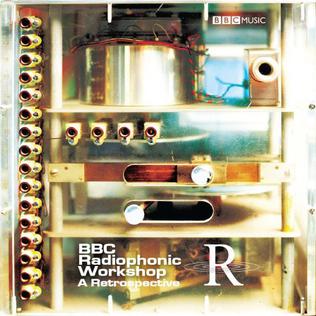
The BBC Radiophonic Workshop was one of the sound effects units of the BBC, created in 1958 to produce incidental sounds and new music for radio and, later, television. The unit is known for its experimental and pioneering work in electronic music and music technology, as well as its popular scores for programmes such as Doctor Who and Quatermass and the Pit during the 1950s and 1960s.
Meglos is the second serial of the 18th season of the science fiction television series Doctor Who, which was first broadcast in four weekly parts on BBC1 from 27 September to 18 October 1980.
Full Circle is the third serial of the 18th season of the British science fiction television series Doctor Who, which was first broadcast in four weekly parts on BBC1 from 25 October to 15 November 1980.
The Doctor Who theme music is a piece of music written by Australian composer Ron Grainer and realised by Delia Derbyshire at the BBC Radiophonic Workshop. Created in 1963, it was the first electronic music signature tune for television. It is used as the theme for the science fiction programme Doctor Who, and has been adapted and covered many times.
Paddy Kingsland is a composer of electronic music best known for his incidental music for science fiction series on BBC radio and television whilst working at the BBC Radiophonic Workshop. Educated at Eggar's Grammar School in Alton, Hampshire, he joined the BBC as a tape editor before moving on to become a studio manager for BBC Radio 1. In 1970 he joined the Radiophonic Workshop where he remained until 1981. His initial work was mostly signature tunes for BBC radio and TV programmes before going on to record incidental music for programmes including The Changes, two versions of The Hitchhiker's Guide to the Galaxy, as well as several serials of Doctor Who. His work on the latter series included incidental music for several serials in the early 1980s.
The Sea Devils is the third serial of the ninth season of the long-running British science fiction television series Doctor Who, which was first broadcast in six weekly parts on BBC1 from 26 February to 1 April 1972. It was written by Malcolm Hulke and directed by Michael E. Briant. The serial is notable as the first appearance of the Sea Devils and features extensive location filming in cooperation with the Royal Navy, as well as an experimental electronic score by Malcolm Clarke.
Peter Howell is a musician and composer. He is best known for his work on Doctor Who as a member of the BBC Radiophonic Workshop.
Roger James Limb is a British composer, specialising in electronic music. He was born in 1941 in Hitchin, Hertfordshire, England, UK. He is best known for his work on the television series Doctor Who whilst at the BBC Radiophonic Workshop. He joined the BBC as a studio manager, before going on to become a television announcer. In 1972 he left this position to join the Radiophonic Workshop, where he remained until 1995. Although he had received formal music training, he also spent much time in pop and jazz bands, the influence of which can be heard in much of his music.

BBC Radiophonic Workshop – 21 is a compilation by the BBC Radiophonic Workshop to celebrate their 21st anniversary in 1979. It was compiled as an overview of their work both old and new, showcasing the changes in the Workshop as they developed from backroom sound effects suppliers for BBC Radio to full-fledged in-house music composers for the whole of the corporation. It demonstrates the move from the musique concrète and tape-manipulation techniques used in the early days, to the synthesiser works of the 1970s. The first side of the album consisted of material from 1958 to 1971, covering their early work creating jingles, sound-effects and some incidental music. This side includes the first material by Workshop founder Desmond Briscoe to be commercially released, as well as sound effects from The Goon Show, Maddalena Fagandini's interval signal that later became "Time Beat", some of Delia Derbyshire's experimental work and the pilot episode version of the Doctor Who theme music. The second side of the record covered the period between 1971 and 1979, including Richard Yeoman-Clark material from popular BBC series Blake's 7 and Peter Howell's vocoder heavy "Greenwich Chorus" theme for The Body in Question. It was reissued on CD by Silva Screen Records on 22 April 2016.

BBC Sound Effects No. 26: Sci-Fi Sound Effects is a 1981 compilation of sound effects and atmospheres created by the BBC Radiophonic Workshop. It was the second in the BBC Sound Effects series to be credited to the Workshop. It featured sounds from popular television series Doctor Who and Blake's 7, as well as effects for the first series of the radio versions of Douglas Adams' The Hitchhiker's Guide to the Galaxy and James Follett's Earthsearch. In 1991 it was re-released on CD as Essential Science Fiction Sound Effects Vol. 1. Reissued on CD with its original title and cover as part of AudioGo's "Vintage Beeb" line 4 April 2013.

Doctor Who: The Music is a 1983 compilation of music from the BBC Radiophonic Workshop featuring incidental music from the popular science-fiction television series Doctor Who. The album was the first full-length to feature solely music from the programme. The collection was produced by Workshop member and long-time Doctor Who sound-effects creator Dick Mills. It featured the original Delia Derbyshire arrangement of Ron Grainer's theme tune and music by Malcolm Clarke from the 1972 serial "The Sea Devils", which was only the second to have an incidental score provided completely by the Radiophonic Workshop. Most of the music included came from serials from the previous three years to demonstrate the recent composers' works. For the album, each serial's incidental music was reassembled into short "suites" and although most of the music had been recorded in mono it was, for this compilation, remixed into stereo with sound effects added on to some tracks. The album was re-released in 1992 by Silva Screen records as Earthshock - Classic Music From The BBC Radiophonic Workshop Volume 1, with bonus tracks including "The Worlds of Doctor Who", a track recorded by Mills as a B-side to Dudley Simpson's 1973 "Moonbase 3" single, which featured a mix of music with sound effects from Planet of the Daleks before following with Simpson's "Master's Theme" and finishing with music from the serial The Mind of Evil. Selections from both this compilation and its follow-up, Doctor Who: The Music II, were also re-used on the 1994 Silva Screen compilation The Best of Doctor Who Volume 1: The Five Doctors.

Doctor Who: The Music II is a 1985 BBC Records album which is a sequel to Doctor Who: The Music released in 1983. Once again, it featured a selection of BBC Radiophonic Workshop music from the popular series. The compilation was made up of material recorded since its predecessor, including music from Workshop newcomer Jonathan Gibbs. As with the first album, the music was reassembled into short suites and remixed into stereo with added sound effects. It was re-released in 1992 on Silva Screen, with bonus tracks, as The Five Doctors - Classic Music From The BBC Radiophonic Workshop Volume 2. Selections from both Doctor Who - The Music albums were also re-used on the 1994 Silva Screen compilation The Best Of Doctor Who Volume 1 - The Five Doctors.

Doctor Who at the BBC Radiophonic Workshop Volume 1: The Early Years 1963–1969 is the first in a series of compilations of Doctor Who material recorded by the BBC Radiophonic Workshop. Compiled and remastered by Mark Ayres, the album features mostly sound effects and atmospheres from the first six years of the programme. Although some incidental music tracks do appear, most of the album's content is by original Doctor Who sound effects creator Brian Hodgson. The compilation also features three Radiophonic Workshop realisations of early Doctor Who composer Dudley Simpson's work.

Doctor Who at the BBC Radiophonic Workshop Volume 2: New Beginnings 1970–1980 is the second in a series of compilations of BBC Radiophonic Workshop music from Doctor Who. The album collected various incidental music from the 1970s including, for the first time, the complete Malcolm Clarke score for the 1972 serial The Sea Devils, only the second scored completely by the Radiophonic Workshop. The compilation also featured a few of Dudley Simpson's compositions as realised by Brian Hodgson, some Delia Derbyshire music as featured in Inferno, two Peter Howell demos from 1979 and a selection of Dick Mills' sound effects from the era.

Doctor Who at the BBC Radiophonic Workshop Volume 3: The Leisure Hive is the third in a series of compilations showcasing the BBC Radiophonic Workshop's work on the science-fiction programme Doctor Who. The album focused mainly on the Peter Howell synthesiser score for the 1980 serial The Leisure Hive, which received its first full release here. The compilation also collected some Dick Mills sound effects from the story as well as some effects from other 1980 serials Meglos and Full Circle, whose music would be the subject of the fourth volume in the series. The final track was a new remix of the original Delia Derbyshire version of the show's theme tune by series compiler Mark Ayres.

Doctor Who: Devils' Planets – The Music of Tristram Cary is a compilation of music by Tristram Cary for the television series Doctor Who. It features all the musical contributions Cary did for Doctor Who except for his music for Marco Polo and "The Ballad of the Last Chance Saloon" from The Gunfighters which was left off due to space reasons. The ballad eventually saw commercial release on the TV soundtrack release of that serial. Due to the folding of the BBC Music label, this album was available only for a limited period and now fetches high prices on auction sites such as eBay.

BBC Radiophonic Workshop – A Retrospective is a 2008 compilation of music and effects from the BBC Radiophonic Workshop. It was released to commemorate the 50th anniversary of the establishment of the workshop and includes material ranging from then to its closure. Many of the tracks were previously released on the BBC Radiophonic Workshop - 21 and The Soundhouse.

The eighteenth season of British science fiction television series Doctor Who consisted of seven four-episode serials broadcast from 30 August 1980 with the serial The Leisure Hive, to 21 March 1981 with the serial Logopolis. The season is Tom Baker's final as the Fourth Doctor before his regeneration into the Fifth Doctor, as well as Lalla Ward's as companion Romana II and John Leeson's as the voice of K9. For the second time, the entire main cast changed over the course of a single season. The season also sees the debut of Matthew Waterhouse as Adric, Sarah Sutton as Nyssa, and Janet Fielding as Tegan Jovanka, the three of whom would remain regular companions into the Fifth Doctor's era, as well as the return of the Master, portrayed both by Geoffrey Beevers and Anthony Ainley.











